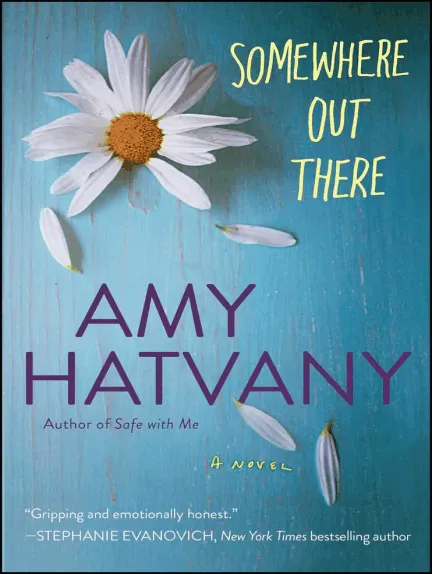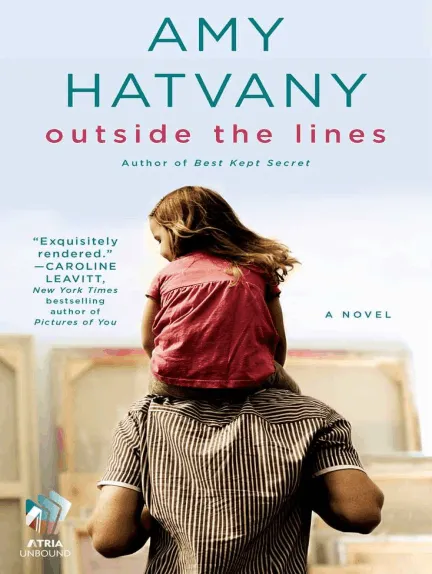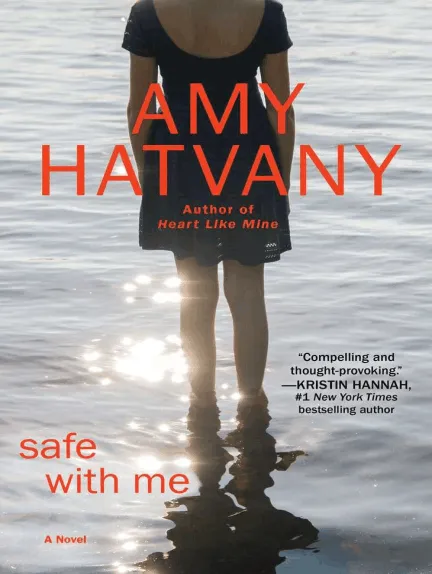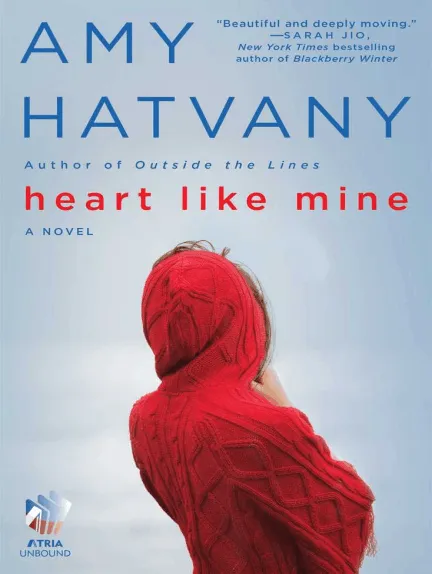We are driving south on I-5 for a full twenty minutes before Tyler speaks again. “Amber, please,” he says. “Don’t do this.”
“Don’t do what?” I squeeze the butt of the gun tighter, the weight of it uncomfortable and unfamiliar in my lap. My dad taught me to shoot when I was sixteen, strictly for self-defense, but I’d never had cause to pick up a weapon before. Not until tonight. Not until it seemed like my only option.
“Whatever you’re thinking about doing,” Tyler says, throwing me a quick sidelong glance, his green eyes dropping to the weapon I’m holding.
“Just drive,” I say, staring out at the long, straight stretch of the freeway in front of us. I was alone in the house the night I snuck the key for my father’s safe from his desk. I stood in his office, feeling the cold steel of the gun in my hands, telling myself that when I used it to confront Tyler, it would help me stay strong—it would remind me that, unlike the night when he raped me, I was the one in control. I wanted to scare him. To make his body shudder in terror, the same way he’d terrified me back in July. I wanted him to freeze up, feel sick, and hope that, whatever I might do to him, it would be over quickly. It was a stupid idea, really, because there was no way he could feel what I had that night. There was no way for me to strip from him what he had taken from me.
I feel light-headed, a sensation that I used to love and now just feels too familiar. I can’t turn off the skipping-record memories of that night. The crowded party. The smell of booze and sweat in the air. The way I danced. The number of tequila shots I took. The way Tyler led me upstairs. Even during the rare moments when I manage to quiet my mind, my body remembers everything. It remembers, and then it’s happening all over again.
I try to focus on what comes next. I’m going to make Tyler drive us to my family’s cabin on the Skykomish River. Our families had vacationed together there more than once. We’d go for spring break, Memorial Day weekend, and at least a week in the summer, taking hikes through the forest during the day and toasting marshmallows and telling ghost stories around the campfire at night. It was a place without electricity or running water, an A-frame, two-story log home with a wood-burning stove and an outhouse. It was an hour away from civilization, secluded enough that no one would hear a gun go off.
“I’m so, so sorry,” Tyler whispers. “If you’d just—”
“If I’d just what, Tyler?” I said, my voice rising. “Forgive you? Move on? Fuck that. And fuck you.” Even as I speak, I can barely believe that it’s him I’m talking to like this. That Tyler, the boy who sat next to me in my hospital bed every day after school for three months straight, making me laugh and encouraging me to do everything I possibly could to live, is now the person who managed to make me feel like I want to die.
My mind flashes to the way he asked me to go to his prom. That even in the midst of the dark place I was in—stuck in a locked eating disorder treatment ward—how excited I’d been to think that I’d be one of the very few sophomores at the dance. It was something I looked forward to as I trudged my way through my individual and group sessions at the hospital with Greta, the therapist whose job it was to help me get well.
“What about eating scares you so much?” she asked me the first time I met with her alone. She was a blond, sturdily built German woman, whose sharp accent chopped off the ends of her words.
“I don’t know. Getting fat, I guess.”
“And what would be so terrible about that?”
I shrugged. “No one wants to be fat.” Fat is easy, I thought. Being thin takes work. It takes vigilance and commitment—it takes a kind of inner strength that other people don’t have.
“I doubt most people want to be so thin that their heart stops,” Greta said, giving me a pointed look. “No one wants to end up in the hospital with damaged kidneys, pressure sores, and a feeding tube, either.” She paused, letting her words sink in. “Do you like being here? Missing school? Not seeing your friends?”
Again, I shrugged, because the truth was that other than Tyler, I didn’t really have any friends. Heather had moved away, and I didn’t hang out with any other girls in my class. Most of them didn’t like me—I never sat at anyone’s table in the cafeteria because I spent my lunch period in the gym doing sit-ups, jumping jacks, and burpees. I didn’t accept the few invitations I got to go to the mall or the movies because I had a strict exercise schedule I needed to stick to during the hours I wasn’t at school: a ninety-minute run as soon as I got home, then another hour or two of calisthenics in my room before having to endure the torture of dinner with my parents. Gradually, the invitations to socialize stopped, and I assumed it was because the girls were jealous of how skinny I was. Their envy sustained me in a way that food never could.
“What does being thin mean to you?” Greta asked. “What do you get out of it?”
“It’s just who I am,” I said. I told her the story of my birth, of starting school late, and always being given more attention and preferential treatment because of my size. I told her how when I started to gain weight, I panicked.
“So being thin makes you feel special,” she said. “And maybe better than everyone else who isn’t?”
“I guess,” I said, slowly, unsettled that she was able to so easily pinpoint what I thought were my very unique, privately held beliefs.
“Okay then,” Greta said. “So can you consider, just for a moment, that maybe all of this isn’t about food or even the size of your body? Maybe it’s about your identity . . . how you’ve always seen yourself. You’ve been conditioned to feel set apart from everyone else, so the idea of being like them in any way is terrifying. Maybe when you think about gaining weight, what you’re really scared of is not knowing who you are.”
“Maybe . . .” I said. I kept my eyes on the floor.
“Your thoughts are more powerful than you know, Amber. You’ve learned to equate thinness with purity and superiority. Your self-worth and how you look are concepts that have become so entwined that your brain sees them as one. We have to try and disentangle them, and then recondition the way you think.”
“Sounds fun,” I said, feigning a lightheartedness I didn’t feel.
“It’s not,” Greta said. “But it is a matter of life or death. Our focus won’t just be on getting to a healthy weight, it will be about finding emotional and mental balance, and figuring out a very different way of defining what it means to be strong.” Again, she paused. “Tell me something. Do you want to die? Or do you want to get well?”
I wasn’t sure how to answer. I thought about my parents and Tyler, how frightened they’d looked when they first saw me in my hospital bed, how much I knew they loved me, and how devastated they’d be if my heart gave out for good. I thought about the self-loathing that never seemed to leave me, no matter how long I went without eating or how low the number on the scale dropped, and I felt a flash of desperation, a need to finally cry out for help.
“I don’t want to die,” I whispered, fighting back tears.
“Good,” Greta said. “I don’t want you to die, either.”
And that’s how it started, my recovery. Tyler’s invitation to prom, and Greta’s gentle but insistent counsel. I struggled a lot, at first, especially as I got to know the other girls on the ward and realized that I wasn’t so special after all—that I was just another case for the doctors to deal with, another one of “those girls” who fell into the trap of wanting to be skinny. I had to turn everything I thought about myself upside down—that “smaller” didn’t actually equal “better” when you were so thin that your hair fell out and your internal organs started disintegrating and shutting down. I constantly had to fight the urge to restrict what I put in my body because the more dizzied I was by hunger, the stronger I felt. I craved the rush of supremacy I felt when other girls looked at me in envy, and I worried that I’d never find another way to look in the mirror and be happy with who and what I saw.
After I left the hospital, striving to find balance was a constant battle, something I had to fight on a regular basis so I wouldn’t get off track. I returned to school in the fall to repeat my sophomore year, and I turned seventeen at the end of September, two years older than my fellow classmates, which made it even more difficult to make friends. I felt different than everyone else—disconnected. I was the sick girl, the one who’d been stupid enough to get so skinny that she almost died, so I spent most of my time focusing on getting my GPA up and spending time with Tyler, who by then was attending Bellingham Tech so he could become a paramedic. We still watched football every Sunday with my dad, and went to home games of the WWU Vikings, cheering on our town’s university team. In watching the players move the ball down the field, I thought about the kind of diet and exercise regimen they must stick to in order to maintain their muscular builds and abilities as athletes, and a proverbial lightbulb went off in my head about how that related to Greta wanting me to find a different way to define what it meant to be strong. The players inspired me, and when I went for a run or lifted weights, I did my best to stop thinking about how many calories I was burning and instead, focused on gaining strength and endurance.
Even so, it wasn’t until I graduated, moved to Pullman, and took my first course in nutrition at WSU that something began to change for me on a fundamental level. In learning about the biological mechanics of how nutrition interacted with how well the body functioned, I was able to see mine more like a machine that needed fuel, and totally separate it from my value as a person. Gradually, my obsessive thinking patterns about food and exercise began to lessen their hold, and I was able to put them in their proper place. My goal shifted from being as thin as I possibly could to becoming healthy, nourished, and strong.
Of course, there were times when I still struggled—my pants might feel a little tight or I might see the number on the scale go up a few pounds—and in a reflexive panic, I’d stop eating and overexercise. But more often than not, I was able to catch myself before I went too far. I spent almost every weekend during the fall watching WSU Cougar football games, either at the campus stadium or on TV, and eventually sparked on the idea of someday using my degree to become a trainer for an NFL team. By the time I met Daniel, in my senior year, I felt proud about my decision to take the worst thing I’d ever gone through and transform it into a career that could help others focus on strength, balance, and health.
“Do you remember what I wore to prom?” I ask Tyler now.
“What?” he says, glancing over to me again.
“Keep your eyes on the road,” I say, then clear my throat. “Your prom. Do you remember my dress?” He doesn’t need to know why I’m asking the question, he just needs to answer it.
He nods, complying with my request to keep his eyes straight ahead.
“What color was it?” I can feel the hum of the truck’s tires hitting the road vibrating through me, a sensation that would normally lull me but, tonight, seems only to amplify the adrenaline coursing through my blood.
“Green. Dark green.”
“Do you remember what happened after the dance, in your car?”
“Amber—” he says, but I cut him off.
“Do you remember, Tyler? Tell me.” The last two words slip through my gritted teeth.
He releases a long, slow breath. “Of course. We were talking and I just . . . kissed you.”
“And what did I do?”
“You kissed me back.”
“And then what?”
“You pushed me away.”
“That’s right.” I think about that moment, when Tyler leaned in and put his lips against mine. It was the first time anyone had kissed me, ever. At first, I didn’t know what to do other than let it happen. I closed my eyes and moved my lips against his, let his tongue touch mine, until a strange buzzing began to sound off in my head, a kind of internal alarm warning me that something didn’t feel right.
“Don’t!” I said, setting my palms on his chest.
“Amber, please,” he replied, as though the words were a prayer.
“And then you told me you loved me,” I say now. “That you were in love with me.” I remember the look on his face when he spoke, the naked vulnerability in his eyes.
“And you said you didn’t love me,” he says. His voice is flat. “Not that way. Not ever.”
“But I did love you. You were my best friend.” Tears sting my eyes and I fight back what feels like a ball of barbed wire in my throat. “I told you that. I said how much you meant to me. And you still stopped talking to me. You didn’t look at me when we were at school, you didn’t come over to my house that entire summer. You totally shut down. It took months for things to go back to normal.”
“I was hurt,” he says.
My entire body tenses. I want to tell him that he doesn’t know what it is to hurt. To ache so deeply that all you want is to scrub away your skin and peel back your muscles so you can get down to the black, malignant damage and gouge it out.
“Were you trying to punish me?” I say, instead. My voice rises again, finally getting to the point of why I’d brought up prom night now. “Is that why you did this? To make me pay for rejecting you? For falling in love with Daniel?”
“God, no,” Tyler says, and I can hear the anguish underpinning his words. “I don’t . . . I never . . . I have no idea why it happened, Amber.”
“It didn’t just ‘happen,’ Tyler,” I say. Tears roll down my cheeks and I hate them. I hate them because they make me seem weak. I’m not weak—I’m seething, a bomb about to explode. “It wasn’t some bullshit passive thing that you had no control over. You made a choice and you did it. You need to take some fucking responsibility for your actions. Man up.” I watch for his reaction to his father’s phrase, the one I know he hates more than any other.
He doesn’t look at me, but his long fingers grip the steering wheel tighter, causing his knuckles to go white. His chest moves up and down, slowly, deliberately, as though he is trying to control his breath. To pause and think about what he will say next. “If there was any way I could take it back,” he finally says in a low, measured tone, “you have to know that I would. I’d do anything.”
“It’s too late.” I turn my head and stare out the passenger side window into the dark, running my fingers down the cold steel barrel of the gun. I think about how there are some wounds unreachable by words, some sins immune to apology. I think about this, and then I think about Tyler. How there are some things you just can’t forgive.




















